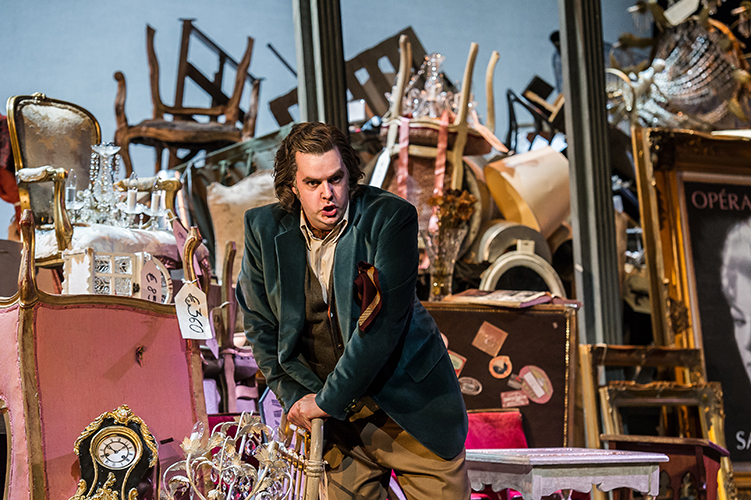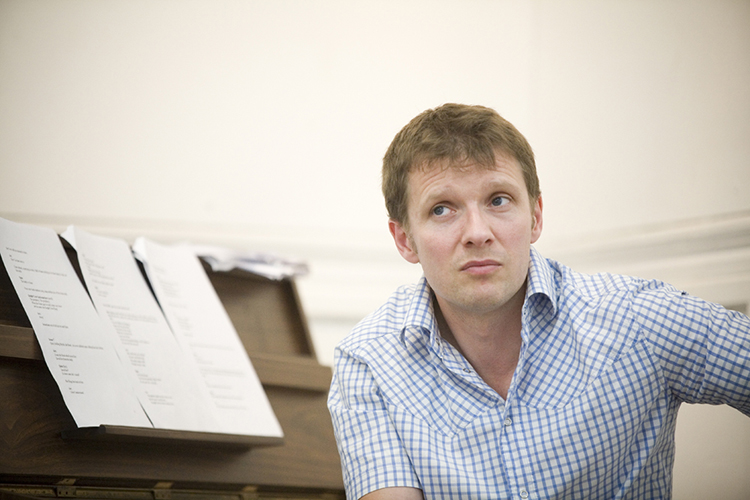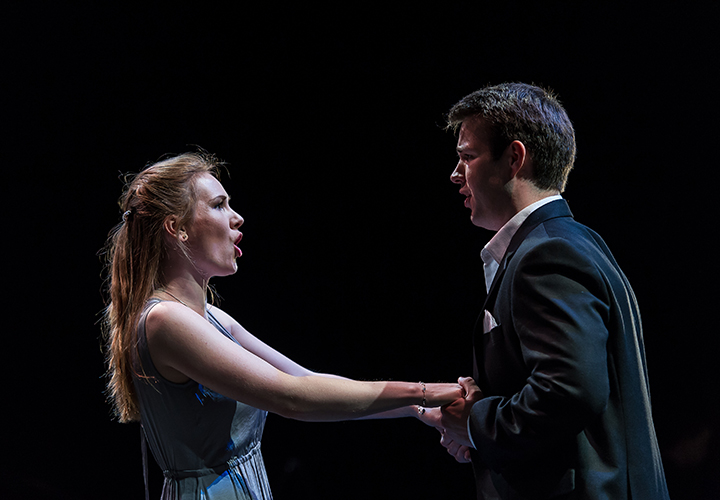
Le portrait de Manon, Nov 2012
Photo by Clive Barda
In September next year the Guildhall School of Music and Drama in London will start an exciting venture: a Masters Degree in how opera is created, developed and performed.* There will be a mere six students grouped into pairs of would-be librettists and composers with each pair assigned singers from the twelve first-year students on the Opera programme. The three groups will each complete a chamber opera by July 2015 to be performed in the newly opened Milton Theatre.
The operas will be directed by Martin Lloyd Evans, resident producer at the GSMD; and teaching will be directed by Dominic Wheeler, Head of Opera and Julian Philips, Head of Composition. A Writer-in-Residence to teach libretto writing has yet to be appointed. During the course the students will move between the academy and the professional world of the Royal Opera House to experience the theatrical process in operation. Students will have access to rehearsals, be able to watch top class singers, and witness how productions develop.
The venture has come about now because three talented, like-minded men, who care about contemporary opera and indeed the future of opera, find themselves in posts sufficiently important to enable them to take this significant step: Philips and Wheeler at the Guildhall, plus John Fulljames at the Royal Opera House as Associate Director.
Dominic Wheeler says: ‘There’s a growing perception among the opera fraternity that we have neglected the development and training of the craft. Today new operas are mere token gestures whereas in the past sixty per cent of operas were new. The art form, any art form, is driven by new works and innovation, and we are finally waking up to the fact that lack of innovation is causing opera to ossify.’
Wheeler suggests that composers during the first three hundred years of opera were able to bear the heavy workload of composing a stream of new works partly because they started with a framework – a set of established conventions – but that in 20th Century these dissolved, and today there are no rules. ‘This is a good thing in part, but we should be able to formulate a few ideas about how you turn music into theatre: what is it that works? We need to admit that we haven’t been writing good music for the theatre.’
A prime mover behind this new venture is Julian Philips. His background is ideal. He knows the value of academic and professional organisations working together. He was Glyndebourne’s first Composer-in-Residence and during that time earned his doctorate from Sussex University creating a chamber opera, entitled The Yellow Sofa, with librettist Edward Kemp. The work, an adaptation of a novella by one of Portugal’s best loved writers, Eça de Quierós, was performed both at Glyndebourne and on tour, including at the Linbury (ROH). He also composed Knight Crew with librettist Nicky Singer (a modern-day version of King Arthur and the Knights of the Round Table) as part of Glyndebourne’s education programme to introduce opera to a wider audience. It involved a chorus of sixty pupils from local schools and six professional opera singers. It was directed by John Fulljames and filmed for the series Gareth Goes to Glyndebourne.

photo by David Ilman
Both these projects illustrate that Philips is no ivory-towered composer, needing solitude. He’s the opposite; he relishes collaboration with all elements of this complex art form: other composers, librettists, singers, with education departments and with audiences. ‘Education has always been central to my work as a composer. Other composers might see this as a distraction, but to me it is germane. Similarly, I enjoy audience development work where I get to talk to those who listening to my work. I enjoy the dialogue with young composers who can challenge me as much as I try to challenge them. I think a composer has a social responsibility to engage not only with audiences but also with the younger generation of composers.’
Collaborating with singers is, of course, vital. ‘You need to consider more than just their range, but also their technical strengths and weakness. I know a brilliant performer, with a great voice, but who is rhythmically not that confident, so I won’t write him music that he will not be able to inhabit.’ This attitude of collaboration with composer and singer will be the spine of the new Guildhall course. Composers will have to write for the voices they have been assigned and will be judged on their ability to do so.
And then there is the librettist. The poor forgotten writer of the words, who commanded top billing in the early days of opera but who fell to the bottom of the heap as the composer rose in status. The course aims to treat the composer and the librettist as equals, which is how it should be since they are inseparable – as the Countess in Strauss’ Capriccio told us seventy years ago. Philips admits that the picture has been bleak for librettists:
‘Writers of opera have been pack horses. They have a core idea, write the libretto and are then forgotten because the world has become music-centric. Everything is subservient to the composer. That’s odd because you can’t write music until you have some words; sometimes the words dictate how the music unfolds and at other times it is the other way around.
‘My desire to compose has always been connected to the written word. I like turning words into music. I think a lot of composers have another art form that fascinates them and text, poetry and literature have always fascinated me as much as music, so I think my desire to compose has always been connected to the written word. I have composed song for voice and piano and choral pieces before opera.
‘On one level, relating music and text might seem the simplest thing – but at another level it is a life-long question about how you make these things co-exist. To what extent do you bring the words into the musical texture? To what extent do you highlight the meaning of the text? To what extent does the music add to the text?’
I suggested that his predilection for turning words into music had a ‘Welsh feel’. ‘I hadn’t thought of it, but you are entirely right.’ Julian Philips is not Welsh but his parents worked in both Cardiff and Swansea, and he lived in Wales until the age of ten. ‘I don’t think I’d be where I am now without that experience. My mother was not a musician but she offered every opportunity to learn musical instruments and no one had to force me to practice as a child. I was so lucky to be in Swansea primary school where the creative arts were so important. There were theatrical things going on all the time and everyone was involved. The importance of creativity was made clear and youngsters are very lucky if they get that. Once you get it it doesn’t go away.’
Philips is indeed unstinting in his praise for the arts in Wales. ‘The performing arts have a unique status in Wales. They are so democratic and so inclusive. There’s a joy in it and it isn’t like that in England.’

in Britten’s Owen Wingrave, June 2013
Photo by Clive Barda
So what are they looking for in the first intake? ‘We want composers who are fascinated by the theatre and who like to collaborate, and writers who don’t have to be skilled in music theory but they must be connected to opera and have experience of collaboration. So far we’ve had more enthusiasm from writers than composers!’
There will be no student directors in the new course. Philips thinks that they have enough of a challenge ahead without adding a fourth element.
‘The hardest challenge for the new course will be the need to be discerning about different styles. We don’t want to impose a style; we must not inhibit the creative process, and it’s going to be a challenge to ensure each group finds its own language. Yes, of course we want the works to be accessible, but accessibility is relative; what is accessible to one person is impenetrable to another. We’ll be happy if next July the audience say that they’re not sure about the first, love the second and need to see the third a second time!’
*Masters Degree in Making Opera (subject to validation), The Guildhall School of Music and Drama: application closed on October 1 but the school may consider late applicants. Fees: Standard postgraduate fees for the School for 2014 are projected to be £9000 (UK/EU) and £20,400 (non EU). Further information: http://www.gsmd.ac.uk/music/courses/postgraduate/ma_in_opera_making_writing/
Banner illustration by Dean Lewis











